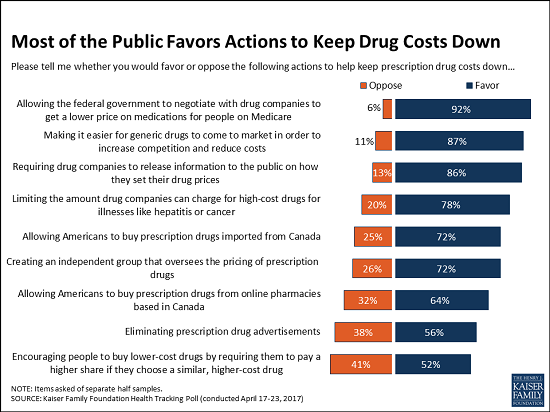In a recent article in The Harvard Business
Review, an author, who is ‘ a pricing strategy specialist’, exhibits an
astounding example of ‘begging the question’ when he states a conclusion and
then seeks a justification of his claim.
He says that ‘cheap drugs’ from
Canada won’t reduce U.S. drug prices simply because no one believes that Pharma
will “lean back”, and allow personal importation of safe, affordable,
brand-name medicines simply because they are “selling drugs at a terrific
discount to Canada.”
Admittedly, Dr. Rafi Mohammed, the
author of the article, has also written an apparently successful book, “The 1% Windfall”, a guide on how to
increase profitability. He is also a contributor to journals, and
is mentioned regularly in articles about the costs of prescription medicines in
the U.S.
Unfortunately, Dr. Mohammed has only
a clinical perspective of profits and company decision-making. He fails to
understand the totality of the potential of the harmful effects upon the society
when ‘profitability’ far exceeds the basic requirements that will earn a
business the funds that are necessary to guarantee its ability to maintain its
operations, and to enter into new products and markets, choosing instead to do
as Pharma has done by charging what the traffic will bear.
He also places a great emphasis upon
pricing success based on the ‘value’ of the products or services offered.
That should cause some to wonder if
the timing of the article is only coincidence, or if it was strategic timing, as
it comes on the heels of an announcement of PhRMA, the trade group of
Pharmaceutical manufacturers, of the launching of a PR/lobbying campaign about the value of the contribution of that its
members’ products of vital medicines makes to American health.
Additionally, The Biotechnology Innovation
Organization , whose members make the $1,000 pills and $100,000 ‘cures’,
launched its own “time is precious” campaign touting that its members provide “up
to a decade” more of life because of the ability of their costly bio-specialty
medicines t0 cure a number of life-threatening diseases.
Or, have both just discovered Dr.
Mohammed’s book and thesis.
Irrespective of the timing of the industry campaigns—and that of Mr.
Mohammed-- all ignore a basic economic fact that affects ordinary, real-life
Americans who are not hypothetical situations in abstract ‘what if?’ theories--simply, that if you can’t afford a medicine it is in and of itself unavailable, and therefore
of no benefit because it is available to
only a limited number of patients.
There are other problems with Dr.
Mohammed’s premise when applied to the
costs of pharmaceuticals. They include,
but are not limited to:
- No one, not even the
most fervent supporters of personal importation of safe, affordable
prescription medicines from licensed, registered pharmacies in Tier One
Countries (not just Canada) has ever suggested that ‘cheap’ personally drugs
were the sole answer to lower medicine prices in the U.S.’
- As to his timing of the
article, one must wonder if it is in response HR 2228, a bi-partisan bill that
would allow personal importation, at this time only from Canada;
- He ignores the fact that
the control of personal importation prescription medicines is not an inherent
authority of the Food and Drug Administration (FDA), but is within the province
of the U.S. Congress to establish the direction of prescription medicine
policy, including but not limited to personal importation;
- He gives no credence to
either the ‘right’ or the ability of Americans to make responsible, personal
decisions to determine the safety and efficacy of brand-name medicines from
Tier One Countries (as Bernie Sanders has said, “Show me the dead Canadians”;
- He talks about pricing
restrictions of many countries, but fails to note that Health Canada and many
other industrialized countries also have Memorandums of Understanding (MOU) in
which many they accept the oversight of participating countries to safety and
efficacy;
- He does admit that it is
unlikely that Pharma will curtail its Research and Development, but fails to
note that much of the cost of that R&D is borne by the U.S. Taxpayer, whom,
after supporting such R&D, is subject to the highest prices in the
industrialized world for their medicines;
- He fails to note that up
to 24 percent of Americans fail to purchase their medicines prescribed by their
physicians simply because they cannot afford them;
- He attempts to make the
issue on of a problem for Seniors, completely ignoring the cost of the denial
of vital medicines to Americans of all ages, not just the elderly.
- His ‘profit-driven’ one
percent strategy does not take into account they historical reaction of
Americans to the abuse of public policy, in this case, the health and
well-being of untold numbers of Americans.
- He shows a complete lack
of understanding of the American political process, leading to his assumed
absolutes based on the one percent theory complete being tossed askew
- Americans have traditionally expressed their dissatisfaction
with the status quo at the ballot box, leading to historic changes in national
policies (i.e., social security, anti-trust legislation, Medicare);
o It is only the extensive and excessive contributions
made to politicians of both major parties, that has allow Pharma to gain it
position of dictating much of America’s health policies;
o As noted above, Dr. Mohammed fails to acknowledge
the ‘totality’ of the challenge and the steps that need to be and likely will be
taken after the 2016 elections. He does acknowledge
but dismisses the plans approached by a number of elected officials or
candidates to change direction of the U.S. policy to halt the pricing
strategies of Pharma that make the cost of prescription medicines—or their
unavailability because of Pharma pricing practices—as being major drivers of
our spiraling healthcare costs;
o This includes, but is not limited to:
1. Price negotiation;
2. A ‘stakeholder’ role for the American
public that supports so much of Pharma R&D,by an increased presence of consumer advocates and private citizen in
policy development, hearings, and opportunities for public comment;
3. A
revised patent policy that ensures the public investment in R&D is
protected in legislation that will provide penalties
if Pharma is abusive in its pricing practices;
4. Reciprocal Memorandums of Understanding
between regulatory agencies of Tier One Countries as validation of the safety and efficacy of the
oversight of personally imported medicines from those countries;
5. Criminal penalties for abuse of pricing
practices based on a ‘what the traffic will bear’ philosophy;
6. Greater transparency in Pharma pricing
practices;
7. An end to direct to consumer advertising for
prescription medicines.
If this long list is not enough
to cause Pharma pause, consider his reference/explanation of ‘differential
pricing’ tactics using the model of a movie theater which, instead of having ‘the
same price for everyone,’ has different and lower prices, in his example, for
students and Seniors.
In his model, the
goal is to ‘’tailor the ‘right’ price to various segments, thereby offering targeted
discounts that will be profitable, with moviegoers who
have often paid different prices seated next to each other.
He further suggests that if the students started
selling their movie tickets at a lower price to those paying a higher cost, the
owners of the theater would suddenly stop offering the discounts. He claims this would be the same if
personal importation is enacted in the U.S , causing Pharma to end discounts or
to impose restrictions upon medicines.
Mr. Mohammed’s ‘leap of faith’ from
a health care crisis caused by unaffordable prescription medicines and pricing
abuses by Pharma leading to Americans’ health being threatened, with the cost
of movie tickets as an example of how and why Pharma employs its pricing
practices is , at least to me, incomprehensible and inexcusable.
So, when you see the extensive,
million-dollar advertising/lobbying/public relations being unveiled by Pharma, enjoy
the show. Just make sure what the cost of your ticket might be.
 February 25, 2016--A Connecticut representative has introduced a bill that would
restrict direct-to-consumer advertising by pharmaceutical companies. Rosa
DeLauro, a Democrat representing Connecticut’s third Congressional district,
has introduced the “Responsibility in Drug Advertising Act,” which would
require a delay of three years on any advertising of newly approved
prescription drugs.
February 25, 2016--A Connecticut representative has introduced a bill that would
restrict direct-to-consumer advertising by pharmaceutical companies. Rosa
DeLauro, a Democrat representing Connecticut’s third Congressional district,
has introduced the “Responsibility in Drug Advertising Act,” which would
require a delay of three years on any advertising of newly approved
prescription drugs. 



